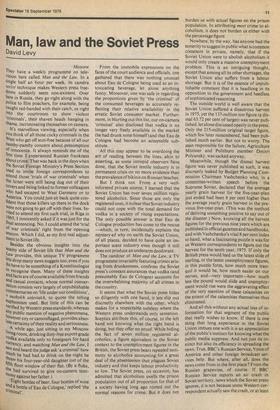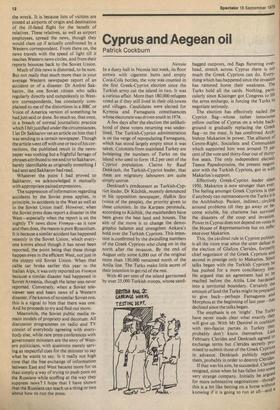Man, law and the Soviet Press
David Levy
Moscow They have a weekly programme on television here called Man and the Law. In a single half an hour per week, its camera verite technique makes Western press freedoms suddenly seem non-existent. Over here in Russia, they go right along with the Police to film poachers, for example, being caught red-handed with their catch, or right Into the courtroom to show violent criminals', their shaven heads hanging in Shame, incriminating themselves on camera.
It's marvellous viewing, especially when
You think of all those cocky criminals in the West who get off scot-free because of all our namby-pamby concern about presumption of innocence. It always reminds me of the first time 1 experienced Russian frankness about crime. That was back in the days when the Soviet Foreign Ministry's Press Section Used to invite foreign correspondents to attend those 'trials of war criminals' when the latter were still being dug out of their Covers and being linked to former colleagues Who had escaped to West Germany or to America. You could just sit back quite confident that those killers up there in the dock were not going to get off with their lives. Invited to attend my first such trial, in Riga in 1965, I innocently asked if it was just for the final sentencing. No. I could attend the 'trial of war criminals' right from the opening session. Which 1 did, as my first real adjustMent to Soviet life.
Besides the obvious insights into the
seamy side of Soviet life that Man and the Law provides, this unique TV programme lets drop many news nuggets too, even if you do have to be something of a Kremlinologist to recognise them. Many of these insights and facts are of course available from friends and casual contacts, whose normal conversation consists very largely of unpublishable Commentaries on 'life under our conditions', nashykh usloviakh, to quote the telling euphemism used. But little of this can be verified by Western press standards, whereas any public mention of negative phenomena, ilowever coy or camouflaged, provides absolute certainty of their reality and seriousness.
While ago, just sitting in my Moscow 'lying room, drinking duty-free export grade vodka available only to foreigners for hard Currency, and watching Man and the Law, 1 saw and heard the judge ask 'a criminal' how Much he had had to drink on the night he threw his four-year-old daughter out of the fifth floor window of their flat. (By a fluke, She had survived to give on-camera testirrl°nY against her father.)
Eight bottles of beer, four bottles of wine and a bottle of Eau de Cologne,' replied 'the From the immobile expressions on the faces of the court audience and officials, one gathered that there was nothing unusual about Eau de Cologne being used as an intoxicating beverage, let alone anything funny. Moreover, one was safe in regarding the proportions given by 'the criminal' of the consumed beverages as accurately reflecting their relative availability in the erratic Soviet consumer market. Furthermore, in blurting out this list, our on-camera 'criminal' also disclosed that vodka is no longer very freely available in the market (he had drunk none himself)and that Eau de Cologne had become an acceptable substitute. .
All this may appear to be overdoing the art of reading between the lines, akin to asserting, as some intrepid observers have done, that the Soviet textile industry is in permanent crisis on no more evidence than the prevalence of bikinis on Russian beaches.
But 1 think not. From a very wellinformed private source, I learned that the Soviet Union has over seven million registered alcoholics. Since those are only the registered ones, it is clear that Soviet industry could not cope with the total demand for vodka in a society of rising expectations. The only possible answer is that Eau de Cologne production has come to the rescue —which, in turn, incidentally explains the mystery of why on earth the Soviet Union, of all places, decided to have quite an important scent industry even though it still does not produce an underarm deodorant.
The candour of Man and the Law, a TV programme invariably featuring crimes arising from drunkenness, confirms the Soviet press's constant assurances that vodka (and presumably Eau de Cologne) accounts for the overwhelming majority of all crimes in the country.
It seems that what the Soviet press hides so diligently with one hand, it lets slip out discreetly elsewhere with the other, which makes for a respectable subtlety where the Western press understands only sensation. Sceptics attribute this, of course, to the left hand not knowing what the right hand is doing, but they offer no proof. While hiding the fact of seven million registered alcoholics, a figure equivalent in the Soviet context to the unemployment figures in the British, the Soviet press bears repeated testimony to alcoholics accounting for a great deal of the absenteeism that plagues Soviet industry and that keeps labour productivity so low. The Soviet press, on occasion, has admitted that alcoholism swells the prison population out of all proportion for that of a society having long ago rooted out the normal reasons for crime. But it does not burden us with actual figures on the prison population. In attributing most crime to alcoholism, it does not burden us either with the percentage figure.
Nowhere, by the way, has anyone had the temerity to suggest in public what is common comment in private, namely, that if the Soviet Union were to abolish alcoholism it would only create a massive unemployment problem. This is an intriguing thought, except that among all its other shortages, the Soviet Union also suffers from a labour shortage. But it is of the essence of unpubI ishable comment that it is headlong in its opposition to the government and heedless of sophisticated reasoning.
The outside world is well aware that the Soviet Union suffered a disastrous harvest in 1975, yet the 137-million ton figure (a dismal 63.72 per cent of target) was never published, let alone discussed openly in the press. Only the 21 5-million original target figure, which few later remembered, had been published much earlier. But not to worry. The man responsible for the failure, Agriculture Minister and Politburo member Dmitri Polyansky, was sacked anyway, Meanwhile, though the dismal harvest figure was never published as such, it was discreetly leaked by Budget Planning Commission Chairman Vashchenko who, in a committee-written speech before the Supreme Soviet, declared that the average yearly grain harvest for the five-year-plan just ended had been 8 per cent higher than the average yearly grain harvest in the previous five-year-plan. (This was the method of deriving something positive to say out of the disaster.) Now, knowing all the harvest figures for the previous nine years which are published in official gazettes and handbooks, and with Vashchenko's vital 8 per cent index to hand, what a fascinating puzzle it was for . us Western correspondents to figure out the harvest for the tenth year, 1975. If only the British press would feed us the latest slide of sterling, or the latest unemployment figures, in this puzzle form, how much more tranquil it would be, how much easier on our nerves, and—very important—how much less the pound would slide and unemployment would rise were the aggravating effect of the very mention of these calamities on the extent of the calamities themselves thus eliminated.
And all this without any actual loss of information for that segment of the public that really wishes to know. If there is one thing that long experience in the Soviet Union imbues one with it is an appreciation of the public's instinct for knowing what the public media suppress. And not just its instinct but also its efficiency in spreading the news. True, BBC's Russian Service, Voice of America and other foreign broadcast services help. But where, after all, does the news come from in the first place ? From the Russian grapevine, of course. If BBC Russian Service reports an air crash in Soviet territory, news which the Soviet press ignores, it is not because some Western correspondent actually saw the crash, or at least the wreck. It is because lists of victims are posted at airports of origin and destination of the ill-fated flight for the benefit of relatives. These relatives, as well as airport employees, spread the news, though they would clam up if actually confronted by a Western correspondent. From there on, the news travels with the speed of light till it reaches Western news circles, and from their reports bounces back to the Soviet Union.
Much of this news is distorted, to be sure. But not really that much more than in your average Western newspaper report of an accident or of a disaster. Dr Andrei Sakharov, the one Soviet citizen who talks regularly directly and outspokenly to Western correspondents, has constantly complained to me of the distortions in a BBC or Voice of America version of something he had just said or done. So much so, that once, in a breach of normal journalistic practice which I felt justified under thecircumstances, I let Dr Sakharov vet an article on him that I was sending to a certain newspaper. Though the article went off with one or two of his corrections, the published result in the newspaper was nothing but a frightful farrago of phrases attributed to me and/or to Sakharov, barely identifiable as originally something I had sent and Sakharov had read.
Whatever the point I had proved to Sakharov, we acknowledged it mutually with appropriate pained expressions.
The suppression of information regarding accidents by the Soviet press applies, in principle, to accidents in the West as well as in the Soviet Union itself. However, when the Soviet press does report a disaster in the West—especially when the report is on the nightly TV news show Vremya—as it now and then does, the reason is pure Byzantium. It is because a similar accident has happened recently in the Soviet Union, which everyone knows about though it has never been reported, the point being that these things happen even in the efficient West, not just in the sloppy old Soviet Union. When that cable car broke earlier this year in the Italian Alps, it was only reported on Vremya because a similar disaster had happened in Soviet Armenia, though the latter was never reported. Conversely, when a Soviet televiewer sees and hears news of a Western disaster, if he knows of no similar Soviet one, this is a signal to him that there was one. And he proceeds to try and find out more.
Meanwhile, the Soviet public media remain models of propriety and decorum. All discussion programmes on radio and TV consist of everybody agreeing with everybody else, while rare press conferences with government ministers are the envy of Western politicians, with questions merely serving as respectful cues for the minister to say what he wants to say. Is it really not high time that the free exchange of information between East and West became more for us than simply a way of trying to push porn on the Russians while scoffing at the way they suppress news ? I hope that I have shown that the Russians can teach us a thing or two about how to run the press.






































 Previous page
Previous page